Final report for ONC16-013
Project Information
This project emerged from a collaboration among four Iowa food hubs and ten farmers that began in 2014. This network demonstrated the potential of shared warehousing and transportation for improving logistics efficiency and increasing the volume of regionally-produced food that can be distributed throughout the state. However, as the participants sought to add more nodes (i.e., farmers) to their network, the challenges of inadequate physical and information infrastructures became apparent. In particular, it was very difficult for them to track inventory movement among the nodes each week. This lack of information has lead to sub-optimal system-wide logistics. Additionally, the food hub managers lacked a systematic method for allocating and tracking the costs of shared physical infrastructure and warehousing services, which is necessary for successful and sustained collaboration.
During this project we researched, developed, piloted and implemented the necessary infrastructure/tools to support this supply chain and accommodate future growth. To accomplish this, we developed an automated label generated system for farms to label boxes, coolers, bags, etc to ensure that product gets delivered to the appropriate food hub. A mobile and desktop app was developed for food hub managers and farms to use to track shipments, track mistakes, and the number of boxes or cases of product moved throughout the distribution network. These systems and tools show the potential of an inventory management system that will enable information sharing across multiple farms and food hubs and support a growing distribution network across Iowa.
During this project we researched, developed, tested and implemented the inventory management system we partnered with several farms and food hubs over conference calls, at in person meetings and one on one at their food hub or farm.
During the summer and fall of 2016 we tested and piloted several versions of a product labeling scheme through the network that works with several types of products (frozen, refrigerated, dry, etc). We also ensured that the labeling scheme worked with all types of ways the food hubs marketed the goods at the end. Some food hubs sell individual units and some sell cases of one product. The labeling scheme was determined it would only label and track the number of boxes or cases not the number of units, for example number of 24 oz containers of yogurt.
After developing the label scheme Dr. Krecji’s team began to develop an automated label generating system using an excel database and a Brother Label printer. Farmers can input the number of boxes they have and what food hub is its final destination. The label generator speaks with the label printer and quickly outputs labels at a low price.
Simultaneously while the label generating system was being developed an app using google servers and open source software was developed to track and manage inventory moving through the network. The app has been test and piloted with a food hub and their truck drivers. In March of 2017 the coordinating food hubs began using the app and label generating software every two weeks when shipments were coordinated.
Once the app was fully tested and put into place the app began to allow the coordinated food hubs to run reports to determine the true cost of the number of cases shipped throughout the network.
At the unset of this project, it was hopeful to be able to implement barcodes and scanning systems into the labeling and tracking app. It was determined after research of available technology it would not be cost effective to implement scanning technology. In the first version of the app and labeling scheme, food hubs will enter deliveries and items received using drop downs and buttons on mobile devices and on a desktop app.
Cooperators
- (Educator and Researcher)
Research
Educational & Outreach Activities
Participation Summary:
The Iowa Food Hub Managers Working Group hosts quarterly meetings around Iowa at food hub's facilities. These meetings consist of professional development activities for the food hub managers. Project coordinators conducted training at participating farms on how to use the label generating software and associated label printers. Project coordinators presented at the Iowa Organic Conference in the fall of 2016
Learning Outcomes
Project Outcomes
Impacts
The project’s inventory management system and labeling protocols have already had positive impacts on the participating food hubs and farmers who are collaborating in the transportation network. While piloting and testing the labeling scheme during the summer of 2017 the labels ensured that, the proper boxes were delivered to Iowa Food Co-op several times. Staff who received the orders caught mistakes several times before the truck driver left their location.
The project has helped to improve communication between the food hubs and have improved the understanding of peers food hub operations and sales patterns. This has improved mutual support for each others well-beings.
After the mobile app has been implemented throughout the network during the next several months, it is expected the project will only increase the impact and provide new data and tools to improve the food hubs and farms’ efficiency and sales.
Accomplishments
The following accomplishments/milestones were achieved during the project.
Iowa Valley Food Co-op purchased a pallet jack and dock ramp to assist in material handling when they received deliveries from the Iowa Food Hub and Farmtable Delivery. The pallet jack allowed them to move the two pallets that regularly came off the Iowa Food Hub truck and then to reload the Farmtable Delivery truck the following day. The dock ramp increased efficiency and strain on staff when loading the Farmtable Delivery truck. Farmtable’s truck has steps on the back and does not allow it to back up to a dock and roll product on and off. The dock ramp bridged gap allowing a pallet track to move product across the gap between the dock and truck.
Dr. Krejci at Iowa State University performed background research to establish methods for allocating costs of shared infrastructure across the supply network and to select and develop an inventory management system. The first step in improving and strengthening the existing horizontal collaboration efforts among the food hubs and farmers in Iowa was to develop standard packaging and labeling guidelines for the farmers in the network. After a series of pilot runs with the four participating food hubs and four farmers (during June to October 2016), packaging guidelines and a labeling format was finalized. The food hubs Iowa Food Coop, Iowa Food Hub, Iowa Valley Food Coop, FarmTable Delivery and the following farms WW Homestead Dairy, County View Dairy, Lucky George Farm, and Early Morning Harvest participated in the labeling pilot.
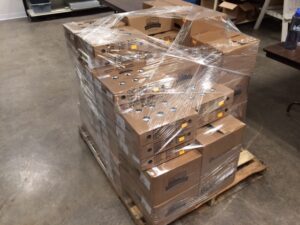
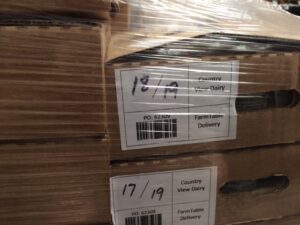
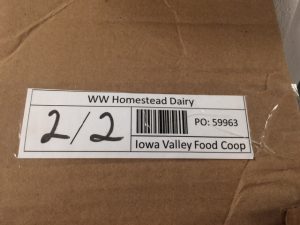
The project team then developed an Excel-based interface to be used by the farmers for generating the labels (in the same finalized format from the pilot runs) using standard label printers. A document describing guidelines for the label generation process was also prepared. This automated Excel-based labeling interface was installed and successfully piloted with one farmer (Country View Dairy) in the second week of February 2017. Following the testing of the label generating tool in person training was provided for Lucky George Farm, WW Homestead and Early Morning Harvest. During this training project staff installed and trained the staff each farm on how to use the software and label printer.
Besides developing standard labeling and packaging guidelines, the research team developed a mobile application (which can be used on iOS and Android-based smartphones and tablets) and a desktop interface that enabled the farmers and the food hubs to track the movements of products in real time, as they are transported from producers to food hubs across Iowa. The overall idea behind the development was to keep the system low-cost and easily maintainable by the food hub managers.
In order to fairly allocate collaboration costs among the food hubs and farmers, accurate data on duration of temporary warehousing of products at various nodes and transportation time and distances is needed. The data that is collected from the labeling interface and the mobile app can be used to devise a cost-allocation mechanism for the system participants.
Dr. Krejci and Jason Grimm held conference calls and exchanged emails with two groups of food hubs in the fall of 2016. In October, a conference call was held with Appalachian Sustainable Development. Their food hub was interested in this project as they are putting necessary procedures in place to track deliveries and pickups of produce from farmers along multiple routes on the east coast. They are interested in seeing the app developed from this project and if they could use it in their business.
In December Dr. Krejci and Jason Grimm held a conference call with the Center for Regional Food Systems at Michigan State. Rick Pirog and Noel Bielaczyc told us about the Michigan food hub network that they assist in coordinating. They reached out to their network and Cherry Capital Foods and Eastern Market in Michigan expressed interest in traveling to Iowa to consult with our foods and network and learn about our food hub network in Iowa.
In May of 2017 four Michigan food hubs traveled to Iowa and spent time Northeast, Central and Southwest Iowa visiting Iowa Food Hub, Iowa Choice Harvest, Iowa Food Co-op and FarmTable Delivery. Our Michigan guests included food hub managers Franklin Pleasant of The Local Grocer (Flint), Bobby Blake of Flint Fresh Mobile Market (Flint), Christine Quane from Eastern Market (Detroit), Jeremy Andrews and Brennan Dougherty from Sprout (Battle Creek), along with Noel Bielaczyc and Nick McCann of the Center for Regional Food Systems at Michigan State University. While Michigan’s hubs are operating in much more densely populated marketplaces, we found that we could learn a lot from each other.
The team will write a report to document preliminary findings, to be shared at the Iowa Food Hub Managers’ Working Group (FHMWG) quarterly meeting.
To share the process and document findings during the project to all Iowa food hubs project staff presented at all the meetings of the Iowa Food Hub Managers Working Group in 2016. Meetings were held in Harlan, Cedar Rapids, Davenport and Mason City in 2016 and in Ames in 2017. Project staff presented to all the food hub managers in attendance during this meeting present updates about the project.
Jason Grimm and Dr Krejci’s team presented at the Iowa Organic Conference in November 2016 to Iowa farmers and local food advocates as well to share information about the Iowa Food Hub Network and to inform Iowa farmers on how they successfully partner with a food hub to expand their sales. .
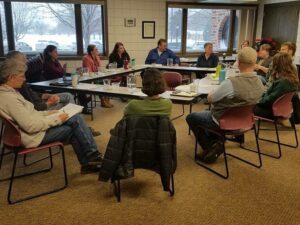
May 9th and 10th of 2017 four Michigan food hubs visited Iowa for a two-day visit to see the participating food hubs. While in Iowa they had the opportunity to learn about the current collaborative network and to share in discussions about operating food hubs in Iowa and Michigan.
At our first stop in Northeast Iowa, the crew learned about the cross-docking system and phone app that students at ISU created through the project. Their presentation showcased the elegant system that helps food hubs efficiently collaborate to transport local products throughout the state.
Next, at the Iowa Food Hub in West Union, general manager Georgia Windhorst shared the story of the hub’s development. The Iowa Food Hub focuses on wholesale business, and also runs a subscription food box program that is distributed at work sites and in rural towns. Georgia talked about the success they’ve had helping public schools purchase local food and the challenges of marketing and distribution in a rural area.
Back on the road, we couldn’t resist a stop for frozen yogurt at Country View Dairy in Hawkeye, one of the farms distributing through the food hub collaboration, before landing at our tour of Iowa Choice Harvest in Marshalltown. Penny Brown-Huber and Jason Durham showed us the impressive equipment they use to freeze and pack local produce, and we sampled some delicious frozen sweet corn.
We ended the first day at Alluvial Brewing in Ames, where members of the Iowa Food Hub Managers Working Group gathered with our Michigan guests to share best practices and challenges — and some much-needed refreshment. Conversations flowed freely as we broke into small groups and discussed markets for meat, best software platforms, retail and wholesale strategies and how to partner with extension and non-profits to help advance a food hub’s mission.
Bright and early the next morning, we drove to Harlan to check out FarmTable Procurement & Delivery. Ellen Walsh-Rosmann shared her story of moving to her husband’s family farm, growing vegetables and realizing that she needed a better way to distribute and move her produce to restaurants and wholesale accounts. She created FarmTable to fill that niche and improve the markets for local farmers. Along the way the business has grown into a beautiful warehouse space and even opened the farm-to-table restaurant Milk and Honey Cafe, serving up delicious dishes featuring locally sourced food. We enjoyed a delicious meal there as the rain ended and the sun came out.
Our last stop: back to Des Moines to see the Iowa Food Coop, where employees and volunteers were setting up for a distribution day. The Iowa Food Coop sells directly to consumers, who purchase through an online marketplace. Farmers receive orders and bring them to the coop, where volunteers help assemble each customer’s order when they come to pick it up.
Our visit was punctuated by farmers dropping off beautiful produce, which helped us get a sense of the community that extends far beyond the brick-and-mortar building and the website that facilitates these transactions. Gary Huber, who directs the Coop’s operations, put it best: “I think the amount of time we spend building relationships that are based on affection, well, that’s the reason we’re still here.” 
As we wrapped up our tour, our Michigan guests reflected on what Gary said about relationships. They were struck and impressed by the cooperation they saw among the diverse hubs in Iowa, and noted the strength that has arisen through a mindset of collaboration rather than competition.
Based on the project's research results, an inventory management system was designed and proposed for the project participants. The beta version of the Excel-based labeling interface (Figure 1 and Figure 2 below) was successfully piloted with one of the participating producers (Country View Dairy) in the second week of February 2017. The mobile app (Figure 3 and Figure 4 below) was then piloted with all participating food hubs and farms the third week of March 2017.
Figure 1: Screenshot of the Excel-based labeling interface
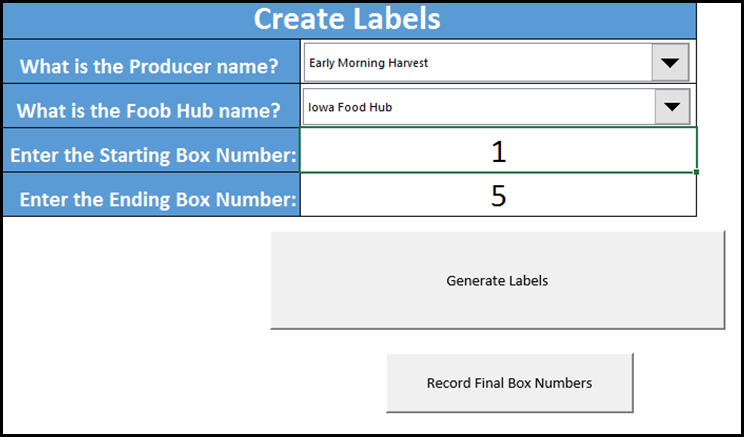
Figure 2: Screenshot of labels being generated from the Excel-based labeling interface
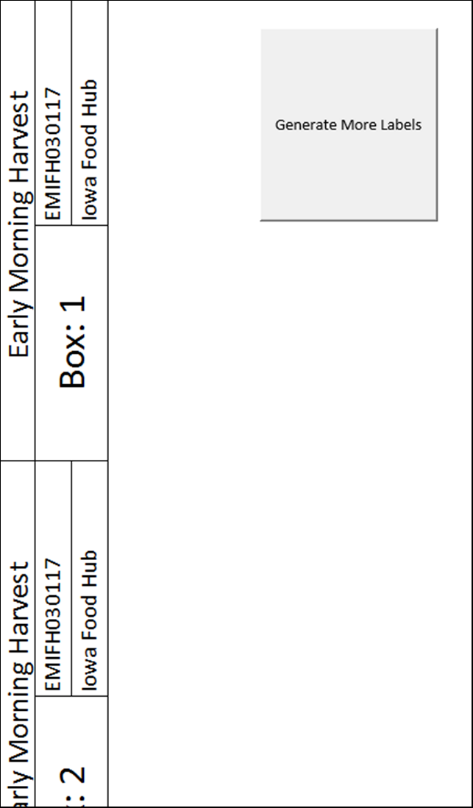
Figure 3 & 4: Snapshot of the mobile app developed for tracking the movements of the products in real time
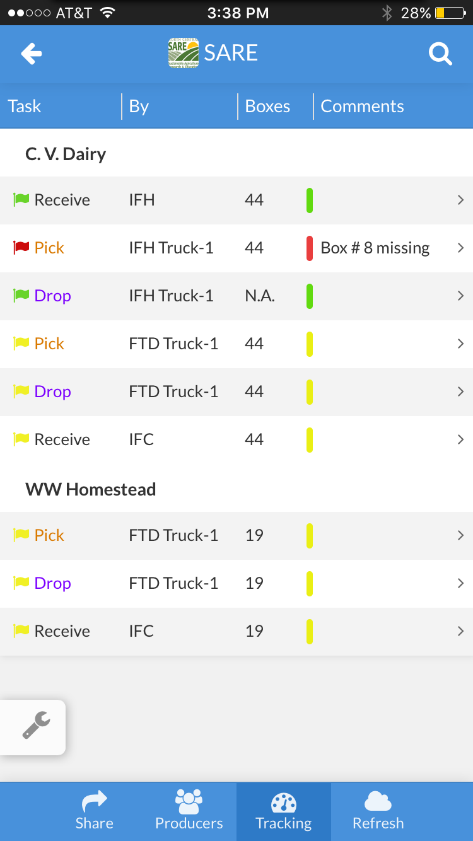
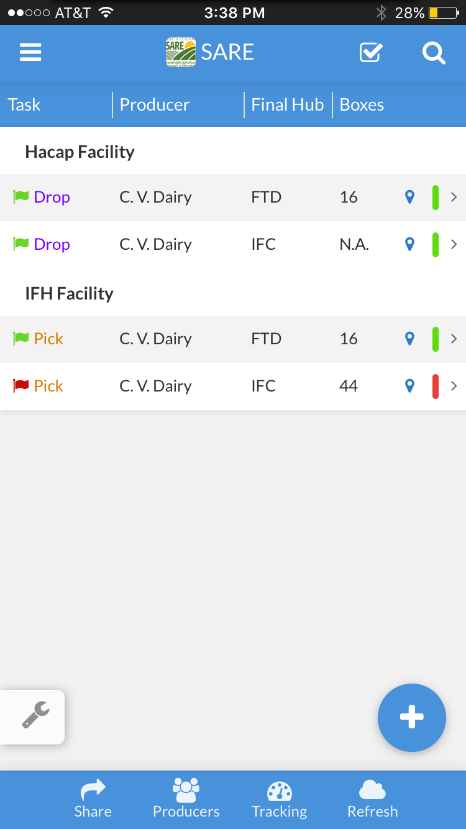
Once the project ended project leaders knew it was important to ensure that the farms and food hubs had the appropriate equipment and software to continue the collaboration.
Label printers, cartridges, and label materials were purchased and delivered to the participating farmers. The mobile application was built using the software AppSheet and the necessary server space to run the app was purchased as well. Dr. Krejci's team then trained each participating farmer and all food hub managers on the new system.
A meeting was organized with all the food hub managers to get the initial feedback on the mobile app in November 2016. Bob Howard (Country View Dairy), Jason Johnson (Lucky George Farm) and Jeff Hafner (Early Morning Harvest) were trained to use the new Excel-based labeling interface. Also, a group training session with all of the participating food hub managers was aimed to train the hub managers to use the mobile app for the pilot run scheduled the third week of March 2017 and to get feedback from them regarding the app design and functionality.
As result of the project and food hub collaborations participating farms and food businesses were about to expand the geographic radius of their customers. Farms and food businesses in eastern Iowa expanded their sales to western Iowa and into Nebraska. Their customer reach was a result of food hubs collaborating and sharing warehousing and transportation services for each. A Country View Dairy could utilize the services of Iowa Food Hub, Iowa Valley Food Co-op, Iowa Food Co-op and FarmTable Delivery to sell their yogurt to customers in Western Iowa and the Omaha, NE metro. 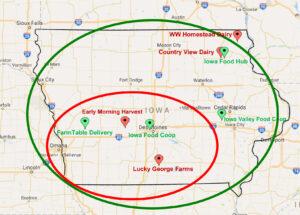
Information Products
- Iowa Food Hub Network Website (Website)
- Blog Post - For Iowa's food hubs, networking leads to solutions (Article/Newsletter/Blog)
- Video: Collaborative Food Supply Chains for Iowa's Farmers (Video)